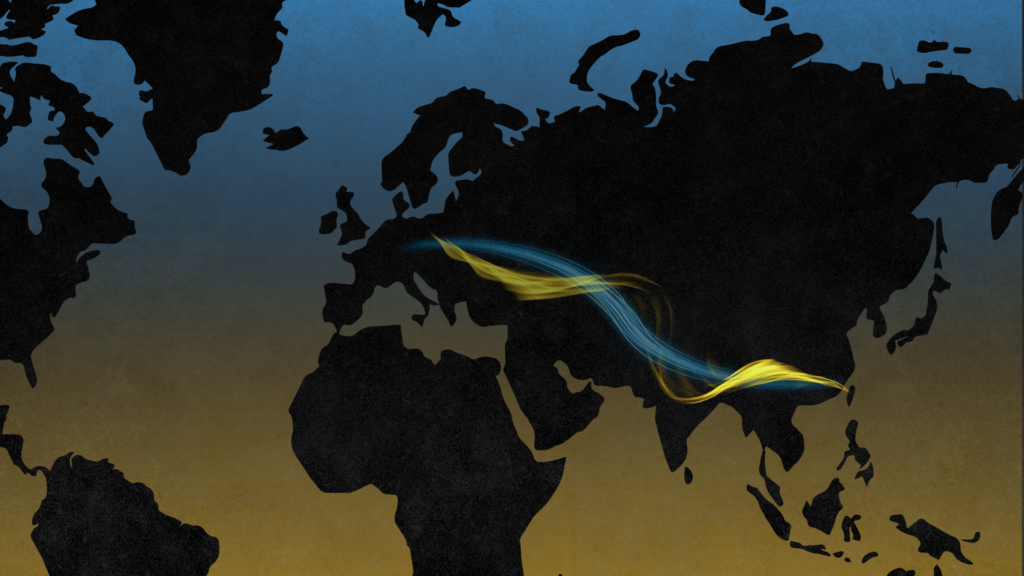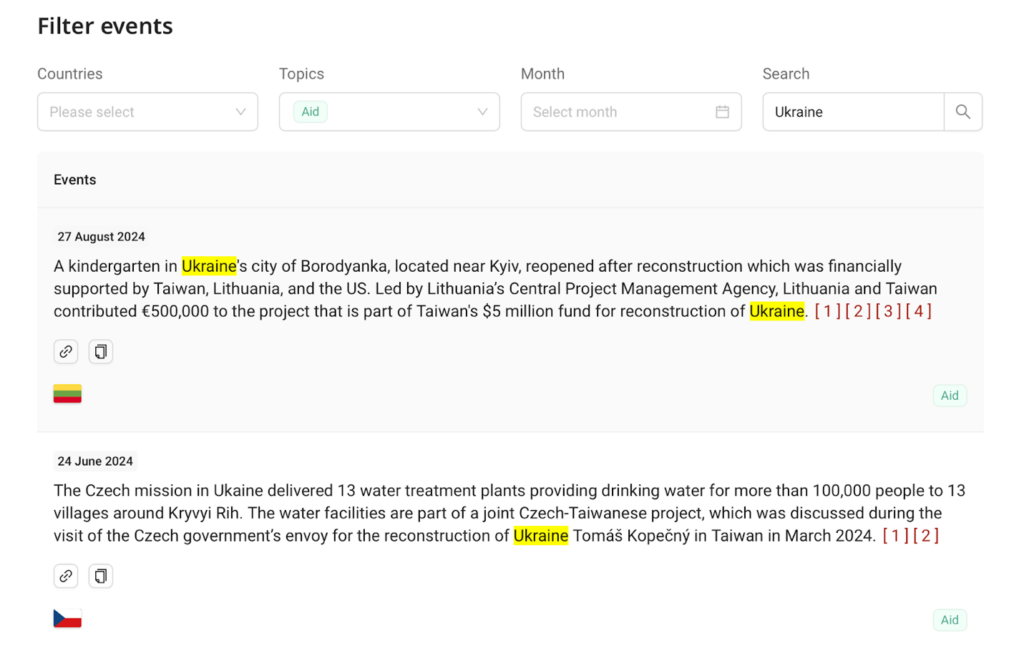Taiwan ranks among the leading global humanitarian aid donors to Ukraine. However, due to the absence of direct communication with Ukraine, Taiwan delivers its aid to Ukraine through CEE countries, further strengthening Taiwan-CEE relations.
Key takeaways:
-
Taiwan ranks among the top five Indo-Pacific nations providing aid to Ukraine, focusing on healthcare, social services, reconstruction, and infrastructure.
-
Taiwan’s aid to Ukraine, valued at over $126 million, is routed primarily through Central and Eastern European (CEE) countries due to the absence of formal diplomatic ties between Taiwan and Ukraine.
-
This has strengthened Taiwan’s humanitarian cooperation with the CEE region in the process.
Within the first months of the COVID-19 pandemic, Taiwan began exchanging medical aid with the European Union. For instance, in April 2020, it donated seven million face masks to eleven European countries, including CEE countries. In return, the Czech Republic, Lithuania, Poland, and Slovakia sent 845,900 COVID-19 vaccines to Taiwan between July and October 2021.
Although modest, these efforts laid the groundwork for greater humanitarian cooperation after Russia invaded Ukraine in early 2022. The scale of Russia’s attack and Taiwan’s own experience of being perennially threatened by a larger, authoritarian neighbor led to an unprecedented increase in Taiwan’s humanitarian aid for Ukraine. In doing so, Taipei also bolstered its cooperation with the CEE region.
Taiwan’s indirect aid
As of June 2024, Taiwan ranks among the top five Indo-Pacific nations providing bilateral aid to Ukraine, following Japan, Australia, South Korea, and New Zealand. While some other countries also provide military aid, Taiwan’s aid packages are limited to healthcare, social services, reconstruction, water treatment, food assistance, power, and heating support.
However, Taiwan’s solidarity with Ukraine is a little more complicated in practice. Ukraine, like most other countries, abides by the one-China policy, and therefore has no diplomatic relations with Taiwan. Because of the lack of formal connections between Taiwan and Ukraine, Taipei has had to route most of its aid and donations to Ukraine via countries in the CEE region in which Taiwan has representative offices. In March 2022, for instance, Taiwan sent its first batch of humanitarian aid to Ukraine, some 27 tons of medical supplies. But it first sent these to Poland, which then transferred them to Ukraine. Shortly after Russia launched its invasion, Poland and Slovakia also assisted Taipei in evacuating more than 60 Taiwanese nationals from Ukraine.
In total, Taiwan has provided more than $126 million and 800 tons of humanitarian and medical aid to Ukraine through the CEE region. Additionally, it has donated 51 ambulances and emergency vehicles to Ukraine via Romania and Poland, while it has also cooperated with the Czech Republic to help provide water treatment plants to secure drinking water in 13 Ukrainian villages.
In addition to routing its aid through state-led schemes by CEE countries, Taiwan has also provided aid to Ukraine via NGOs in the CEE region, such as Lithuania’s Central Project Management Agency, the Polish Center for International Aid, the Slovak Open Society Foundation and Pontis Foundation, the Estonian Centre for International Development, the Association Romania-Taiwan, and Romania’s Fundația Pontica.
The primary reason for going through CEE countries is that Taiwan does not have a representative office in Ukraine. Another reason is that Beijing has expressed an interest in supporting Ukraine’s post-war reconstruction. Seeking to keep this option open, Kyiv doesn’t want to needlessly anger China by directly engaging with Taiwan.
Most of Taiwan’s donations are from government funds, yet the Taiwanese population has also funded a considerable amount, raised through campaigns such as the Relieve Disaster Foundation. Between March and April 2022, for instance, the Taiwanese people raised nearly $33 million in humanitarian aid. In addition to raising money, the Taiwanese people also wanted to contribute goods, such as milk powder. Relief supplies were collected in Taiwan’s MOFA cellar garage before being sent off.
For information on aid deliveries, see CEAIS’s EU-Taiwan Tracker and filter entries by category “aid” and/or search for keywords “Ukraine/Ukrainian”
Using local links
While most of the aid flows through CEE countries, some was also delivered directly, although not on a state-to-state basis. Because Taipei does not have direct lines of communication with the highest echelons in Kyiv, and prior to 2022 there was hardly any contact whatsoever, donations are sent to Ukraine through local governments and their mayors or through churches, such as the Orthodox Church, with whose leadership Taiwan’s then-foreign minister, Joseph Wu, had a video call in June 2022. In January 2023, for example, the Kyiv City Council received the two high-power generators purchased using the $1 million that Taipei had donated. In January 2023, Wu signed a memorandum of understanding with mayors of two Ukrainian cities (Kharkiv and Mykolaiv) and an NGO designated by the Kherson Region to donate another $2 million to help these cities procure power generation and heating equipment. In January 2023, Taiwan’s Ministry of Digital Affairs donated tablets and robot-related equipment to Ukrainian students in Lviv. In August 2023, Taiwan donated laptops, tablets, and robotic kits to three schools in Poltava.
Since 2020, Taiwan has made significant progress in its relations with the CEE region, strengthening political, trade, and cultural ties despite the absence of formal diplomatic relations. Its humanitarian aid to Ukraine has further reinforced this engagement. Indeed, it has hit two birds with one stone: supporting democratic values and enhancing regional relationships.








